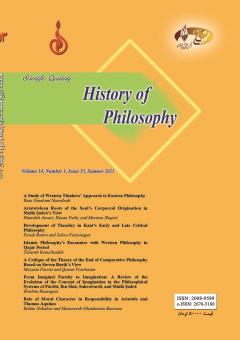Aristotelean Roots of the Soul’s Corporeal Origination in Mullā Ṣadrā’s View
Subject Areas : ریشهشناسی مکاتب و آراء فلسفی در ادوار قدیم و جدیدHamideh Ansari 1 , Hassan Fathi 2 , Morteza Shajari 3
1 - PhD Candidate of Philosophy, University of Tabriz, Tabriz, Iran
2 - Associate Professor, Philosophy Department, University of Tabriz, Tabriz, Iran
3 - Professor at the Philosophy Department, University of Tabriz, Tabriz, Iran
Keywords: corporeal origination of the soul, formal substance, perfection of body, unitary synthesis of the soul and body, unity of the soul’s faculties , Aristotle, Mullā Ṣadrā,
Abstract :
Philosophers have presented different views about the whatness and truth of the soul based on dualism (immateriality of the soul based on the pre-eternity and origination of the soul before the existence of the body or along with it) or monism (corporeal origination of the soul). Mullā Ṣadrā believes that the soul is corporeally originated. The principles of the Transcendent Philosophy, including the trans-substantial motion, the principiality and gradedness of being, and the corporeal origination of the soul, have made it possible to demonstrate corporeal resurrection. Aristotle also believes that the origination of the soul is corporeal. However, the extent to which Mullā Ṣadrā is influenced by Aristotle’s ideas in this regard has never been studied so far. This paper is intended to explain the Aristotelean roots of Mullā Ṣadrā’s discussion of corporeal origination following a comparative-analytic method. The findings of this study indicate that in defining the soul as a “natural and organic body” and, following it, considering the soul as a formal substance and a primary perfection of the body, as well as believing in the unitary synthesis of the body and the soul and the unity of the faculties of the soul, all indicating the corporeal origination of the soul, Mullā Ṣadrā is under the influence of Aristotle. Nevertheless, Aristotle’s approach suffers from some ambiguity because of the existing implicitness in some of his words and not referring to an explicit standpoint regarding the principiality of existence or quiddity, presence of motion in substance, and gradedness of existence.
ابن رشد (۱۳۷۷) تفسیر ما بعد الطبیعة ارسطو، تهران: حکمت.
ابن رشد (۱۹۸۰) تلخیص کتاب المقولات، (ارسطو)، ج 1، مصر: الهیئة المصریة العامة.
ابنسینا (۱۴۰۵)، الشفاء (الطبیعیات)، قم: کتابخانه آيتالله مرعشی نجفی.
ارسطو (۱۳۸۵) مابعد الطبیعه(متافیزیک)، ترجمۀ محمد حسن لطفی، تهران: طرح نو.
ارسطو (۱۳۹۱) دربارۀ نفس، ترجمۀ علیمراد داودی، تهران: حکمت.
افلاطون (۱۳۸۰) دورۀ آثار افلاطون، ترجمۀ محمد حسن لطفی و رضا کاویانی، تهران: خوارزمی.
تیلور، سی.سی.دبلیو (۱۳۹۲) تاریخ فلسفۀ غرب ۱:از آغاز تا افلاطون، ترجمۀ حسن فتحی، تهران: حکمت.
حسن زاده آملی، حسن (۱۳۹۳) عيون مسائل النفس و سرح العيون فی شرح العيون، ج 1 و 2، تهران: امیرکبیر.
داودی، علیمراد (۱۳۸۹) عقل در حکمت مشاء از ارسطو تا ابنسینا، تهران: حکمت.
ساکت، امیر حسین (۱۳۹۴) «پروکلوس و مسئلۀ خوریسموس»، جاویدان خرد، 27(12)، ص 68ـ 51.
عین القضات همدانی (۱۳۸۶) تمهیدات، تحقیق عفیف عسیران، تهران: منوچهری.
غزالی، محمد بن محمد (۱۴۱۶) مجموعۀ رسائل، بیروت: دار الفکر.
فخر رازی (بیتا) المباحث المشرقیة، قم: بيدار.
کاپلستون، فردریک (۱۳۷۵) تاریخ فلسفه (یونان و روم)، ج1، ترجمۀ جلال الدین مجتبوی، تهران: علمی و فرهنگی ـ سروش.
ملاصدرا (۱۳۶۸) الحکمة المتعالیة فی الأسفار العقلیة الأربعة، تعلیقات ملاهادی سبزواری، جلدی، قم: مکتبه المصطفوی.
ملاصدرا (۱۳۸۶) مفاتیح الغیب، تصحیح و تحقیق نجفقلی حبیبی، تهران: بنیاد حکمت اسلامی صدرا.
ملاصدرا (۱۳۹۲) شرح حکمة الإشراق، تعلیقات صدرالمتألهین بر شرح قطبالدین شیرازی، 4جلدی، تهران: بنیاد حکمت اسلامی صدرا.
موسوی خمینی، روح الله (۱۳۸۱) تقریرات فلسفه امام خمینی ره، سید عبدالغنی اردبیلی، تهران: مؤسسۀ تنظیم و نشر آثار امام خمینی (ره).
هجویری، علی بن عثمان (۱۳۷۵) کشف المحجوب، تحقیق قاسم انصاری، و ژوکوفسکی، والنتین آلکسی یویچ، تهران: طهوری.
ولیکز، کی.و. (۱۳۸۷) «پسوخه در برابر ذهن» ترجمۀ محمدرضا طهماسبی، ذهن، شماره 35ـ34(9)، ص 110ـ81.
Ross, W.D. (1923). Aristotle. London: Methuen and Co. Ltd.


